Growth of a Remote Startup with Flowtrace II: How to Manage Time
Read to learn from Olga, CEO of Monshare, how to manage time when you are building remote team with a goal aligning everyone across 3 continents.
What is the metaverse, and has is already dawned? How we conduct ourselves in this world and how we maintain the control over the corporate creators.
This article is looking to answer what exactly is the metaverse and what could define the age of metaverse, and has the age of metaverse already dawned? We are also taking a look into possible Kafkaesque world in which corporate overlords (Meta.com et all) control how we conduct ourselves.
To get started I want to give you the definition of the word metaverse, and by its narrow definition we conclude it means a virtual-reality space, or in other words, a virtual universe. I know I'm taking a risk of using this word that might not be relevant in a couple of months' or years' time. However the concepts, and thinking, is timeless no matter how you view them.
For the purpose of this article, we are envisioning the metaverse definition is extended to include all online communities, enabled by the internet and augmented with any types of extended reality, or their communities within.
This posting will assess what the metaverse is, where are we now, what it could look like in the future and what possibilities the 'Age of metaverse' may present.
This article is not about the immediately recognizable parts of the metaverse like consumer app's such as Instagram, TikTok, Facebook and all.
Instead, I want to take a look into the world of business and what the metaverse looks like from this context. Throughout this article, I focus on the current trends, economic opportunities of the metaverse, how to conduct business and how to interact within.
It's needless to say that the Pandemic has shifted how our societies work and connect. The future of work was dramatically accelerated and we in the industry of "The future of work" find ourselves trying to define the next stage of the future of work.
I think we all agree that 'Great Resignation', 'Remote Work' and 'Hybrid Work' are just a way to describe the processes as part of the current transformation we are undergoing. We will find a new equilibrium and this article is my attempt of trying to look into a crystal ball and forecast what the future entails. (Please "hold my beer" while I stumble into it).
Metaverse as a term is making its way to the general knowledge, and it is doing it fast. It seems like the social media trends we have seen since the 2000s are continuing on their trajectory and creating an online world where we take part in social interactions previously reserved for the physical world. If you think I'm wrong, I encourage you to read on and consider the perspectives.
Have you heard about the concert of Travis Scott, which was attended by over 12 million people interacting with him? Don't worry if you missed the memo, as you probably weren't the target demographic.
By the way, the concert was not televised, but took place in an online world, in a game called Fortnite. Let's take a step back, and let that sink in. 12 million people logged into their game, to see their idol perform a virtual concert, where he released his latest songs during the early days of the pandemic. 12m people!

Fortnite - Online Concert of 12 Million Attendance - Image Credits: Travis Scott & Fortnite
Generations have moved more and more of their social interactions to the online world. It started with SMS's and slow dial-up modem enabled chat rooms, but in the 2020's these feel like a distant past.
TikTok, Snapchat, Facebook, Instagram, WhatsApp, Clubhouse; are all platforms for online social interaction. We should not forget how many of us connected with our smaller circles of friends over video calls, and online games during the pandemic.
The social platforms weren't equipped to meet the demand what we exerted for our social belonging so we found alternative ways to connect using business communication tools for video conferencing.
So what are the current business equivalent for these consumer platforms? Email? No, think again. LinkedIn, no, but we are getting closer. Zoom? We are closer, but my gunning feeling is that we are lagging in the business context.
I believe the wider B2B industry and the economy as a whole is just starting to catch up with the consumer side of the online-based social interaction economy.
We have long standing industries like near and off-shoring, which are sort of location independent. Then we have pioneering freelance marketplaces like UpWork, defining the gig-economy, where you can tap into skills you need no matter where in the world the individual is from.
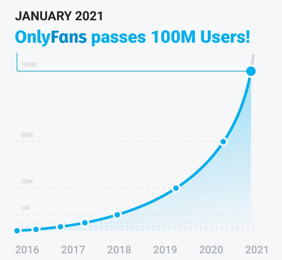
I find it interesting that it's the porn industry again leading the pack for media attention about the online economy. Who I'm talking about? Well, it's the steamrolling success of OnlyFans of course. I think OnlyFans can be considered a proto-entity of the future-of-work where you can conduct business without ties into the physical world, and in this case, being protected, and distanced from the potential harms the professionals of the customer encounters when they used to conduct business based on physical location. It's good to remind ourselves they are not fully untangled from the physical world either, as is evident from the spat they had with their payment provider earlier in the year.
Let's start with a quick recap of the past couple of decades since the advent of personal computers in the '90s. Computers in the offices were followed by the adoption of internet connectivity and emails.
Yes, those nasty blurbs of information whizzed through the business world with a speed of light. This was an incremental improvement to the postal letter, just like a faster horse would have been in the early 20th century to be honest. We also witnessed the first generation of SaaS companies which in all honesty offered a hosted database and user interface to access information.
In the last decade we saw a boom of the second generation of SaaS businesses, redefining how we conduct business and adapting our processes to meet the expectations of the client, who at the end of the day is a digital consumer for the online platforms.
When the pandemic sent the world haywire, we literally moved our social business conducts into an online world. International business travel came to a halt and was replaced by online meetings. Working with your colleagues meant hours of communication through online chat tools, having a huddle or joining a Zoom meeting.
The ways how we adopted to the paradigm shift with these tools was fast and remarkable. Keep in mind these tools were never designed to be switched on at such scale and albeit act as a replacement for traditional work processes and habits, but they kept us going.
Being tied into physical location suddenly became obsolete and we all cherished this new found freedom.
We could finally be where we want, and live the type of life we wanted to. Some companies trying to enforce hybrid models with 4 days a week in the office discovered a bumps in the road. It's like Britain longing for the days of the Empire, without the acknowledgement that the world moved on from the sails and steam-powered merchant fleets.
As a startup founder, I belong to the wider ecosystem and I feel like we have marketplaces popping up into nearly all professions that comes to mind.
The way we connect with these professionals is also changing, would it have ever occurred to you that you could have a plumber visiting your house over a video call for a quote just a couple of years ago?
This is a fundamental shift that saves us time and untangle professions from the immediate physical location to conduct business.
Although we live in a highly globalized world of trade and economic activity, many opportunities are still hindered by or confined within national borders.
The 18th century which gave a rise to nation states, usually preceded by empires, a sub-state of sort and this movement gave the raise of current concept of a border.
Conducting business across borders has been a goal for many nations, not to least to mention the EU, and European Schengen area, with a purpose of a unified economic area.
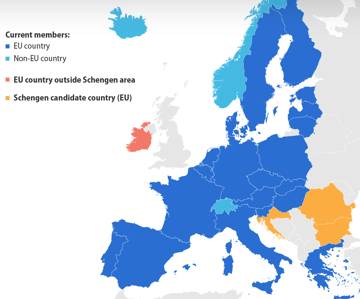
Have we inadvertently entered into a world-wide Schengen area, where the economic activity can be conducted from anywhere, and at any time? It seems like the internet has enabled us to do so, with our behavioral changes during the pandemic having fast tracked our acceptance and demand for such a world. In the couple of years we have heard about a Nomadic work lifestyle, we have got remote worker Visas, and we have adopted a way to live untied from the physical location of the work. This is not true for all parts of the economy, but significant parts of knowledge worker driven industries.
Or have we inadvertently, without a conscious thought, and plan, arrived to this global marketplace in a way that is to the best sense, been an accident? It most certainly seems like it when companies hire across the globe without a concern of the nation, or continent, the common theme seems to be an internet connection, and a certain level of language commonly understood in by a global workforce.
Instead of national job market, should we be talking about global job market? How do you prepare for the changes in global supply and demand needs of 2020's worker?
How about the governmental efforts to create jobs in the local economy, when companies don't care about the location of their staff, but care about the skill and the experience over physical ties to the office of said company.
I do find it ironic that I'm writing this essay overlooking a picturesque view across London, the capital of UK, who through its own people choice, decided to untangle itself from the world's largest common economic area just a mere 5 years ago.
Who controls the power of the newly forming metaverse cannot be discussed without referencing the current struggles of the Facebook, or Meta.com, and other silicon valley giants.
EU legislates as fast as it can and fines the big players on behalf of citizens meanwhile nations across the globe are setting minimum taxation rules for corporations to reign in the competition with tax-domiciles.
I really don't take stance what is right, and what is not, but I'm seeing that all these efforts compare to an attempt of moving a mountain with a shovel. Meanwhile Facebook is claiming that GDPR rules don't apply as users have entered into a contract with them when they signed up to the platform. Whoa, seriously? Luckily I'm not the only one who thinks this is a joke.
However, it's all these mundane and un-sexy things like taxation, customs, employment laws, privacy laws, policing of said laws, the courts, and currencies which are required to conduct business in a global metaverse.
Where on earth is the progress on the governance of the future for the online economics? I don't want to see that its companies chasing the opportunities in the global marketplace whose terms and conditions define what the 'Laws' of any given community are. Hello! Politicians! Why are you not taking this seriously? Is it that you are still mostly Boomers and so far detached from the current society? I think we need a generation, or two, of younger representatives to keep our societies on track.
These new metaverse bubbles, or platform are not proving the equal opportunities to develop businesses and wealth as they by default protect the owner of the said part of the metaverse. National states and court systems are neither equipped to arbitrate any disputes arisen in the metaverse, and by default, they have no jurisdiction outside of their national borders.
I'm pragmatic, and won't lose sleep over the thought that a large corporate somewhere has defined the laws of the world(s) future. However this does require consolidated efforts of societies to come to an agreement how to create a safe, just, and equal metaverse unlike the dark corners of the internet called 'Dark Web' where everything goes as long as price is right.
I think this is a natural bridge to mention cryptocurrencies, which I'm not a biggest fan of, nor will contribute too much space for:
Are governments of the world really on top of their duties regarding fiscal policies, and central banks about their FIATs, when just around the corner speculation is rife, manipulation is the norm, and regulation is non-existent for blockchain based, hidden-ownership-by-design currency transactions? I leave it just there, as I know the metaverse economy, by definition global, requires a currency that is equally unhindered by national borders.
Enough recapping and wondering about the current state of the world, let's look into what opportunities the metaverse creates instead. I'm going to focus on people and human interaction in the following chapters because that's what I feel passionate about.
I'm breaking the opportunities into 3 broad categories and how these could play out in the near future.
Creative destruction is reserved for looking at the current state of the industrial economy and scrutinizing the phrase '4th Industrial Revolution'.
In the second part I'm testing assumptions about the future needs of management, leadership and strategies equipped to deal with the changes of the near future, and how to be successful.
As a last step, I look into what kind of job creation processes are going to define the talent marketplaces of the metaverse.
Have you heard about the 4th industrial revolution? This phrase was coined towards middle of the last decade, 2015 to be exact, and is said to be a distinct revolution rather than prolongation of the 3rd industrial revolution. I leave the judgment for the future historians and anthropologists, but claim instead that this stage feels already outdated.
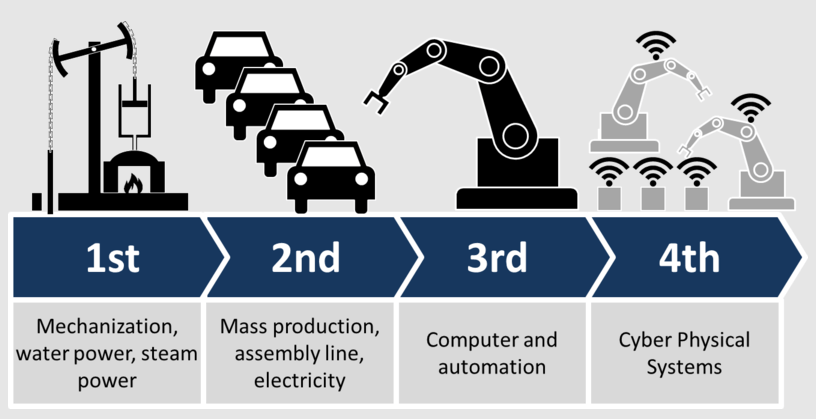
The 4 Industrial Revolutions - Image Credit: Christoph Roser at AllAboutLean.com
The central claim of the phrase '4th Industrial Revolution' is inter-connectedness of the physical world. I think that says it all. It does include principles of information transparency, technical assistance and decentralized decision making, which I'm fully onboard with.
The main premise and the vision of the revolution about interconnection physically surely looks like an incremental step, instead of revolutionary step forward. Extending, or augmenting human capabilities with virtual world by definition is part of the physical world. This again alludes me to think the 4th revolution is actually just an iteration of the 3rd industrial revolution.
I am trying hard to come up with examples where existing players have been the defining members of the future leap into the future and have filed to come up with convincing examples.
On the other hand, I can come up with plenty of examples where previous leaders failed to see the next leap and ended up being forgotten.
I'm looking at you Kodak and Nokia as a recent examples. When we put this into context of financial crisis of 2007-2008, and the following years of ultra-low interest rates,
I'm seeing a flood of failing juggernauts who have only stayed a float because of the size, and sheer plowing of cheap money into the problem. They have often done this on the expense of innovation or the future rewarding their owners with most of the disposable profits.
The upcoming period of economic growth or volatility could become a breeding ground of new innovation.
When we allow the existing obsolete business models to fall, we create space for new and innovative ideas which spur the need and demand we cannot foresee.
It's just like evolution, the mass-exodus is always followed by an explosion of new species capturing the newly freed parts of the ecosystem.
I'm looking forward to the future, which might be painful in the short term, but I do believe the better future waits us on the other side.
The famous Peter Drucker quote says that "culture eats strategy for breakfast". This implies that company culture, created and nurtured by your people, always determines success regardless of how effective your strategy may be. This has been relevant in the past, its relevant now, and it will continue to be relevant in the future. Strategy, when defined by the people and rallied behind by the whole team is what drives ultimate success.
Many companies have failed to put people at the center of what they do, and change is on its way.
For many companies this is too late, though. By going against the will of your employees, i.e. forcing your team to come to office 4 days a week, to attend a workplace 9-5, for the sake of 'managing' your employees is not something that most of us are going to put up with.
I expect to see divergence of types of companies which adapt to the new way of working in an online world, and to those who continue to maintain their processes inherited or optimized at a different time and age.
I believe Flowtrace is at the forefront of creating the workplace of the future, which enhances a global talent pool, making frictionless team collaboration part of company strategy and culture.
Now, its important to distinguish that I don't mean physical space, or replication of it in the future. What I mean is in its wider definition, by creation of a space, visibility in it, shared experience of it, and transparent way of seeing how the organization of the future works.
This hopefully sheds light into the subjective world of "office-based management" and how it will put demands to upskilling our managers and the ways how we used to conduct business.
Something tells me the micromanagers of the past world will find their way to metaverse and we should be wary of making this habit harder to practice rather than easier by monitoring everything at the expense of privacy.
In a world defined by online interactions, like being able to huddle people around for informal information exchange, let it be engineered, or impromptu, innovation will continue to foster.
If you can take advantage of gathering an exponentially more varied group of people for brainstorming, or ideation, I bet the resulting innovation for your business will take huge leaps forward.
Looking at it from this perspective, the fact is that we have been confining these interactions, peoples backgrounds, past experiences and the knowledge and information held, into physical buildings, seems counter-productive if innovation and novel thinking has been a desire.
Now with the advent of Meta.com (the collective new name of Facebook owned companies), I looked into some academically oriented research on the topic in hand. I came across a quote that deeply resonated with me, and ingrains long belief I have held throughout my career, as a inter-team communicator, and as a startup leader:
"Every meaningful action in an organization, such as knowledge creation or decision-making, tends to depend on the success of communication and information transfer"
Given this is true, and assuming the future of business is in online, one can only conclude that the future of success is going to still be defined by people, their relationships, and capabilities to communicate effectively.
I need to admit, communicating in a distributed team, based on online tools is harder than a random encounter at the water-cooler. This does not need to be like this though.
Giving a dominance to one form of communicating over another should be done at least consciously and probably should not be done at the expense of the other forms. I would rather seek a balance in means of communication and use the best tool for the job in hand.
This reminds me, in the business world we sometimes forget the fact that communication skills are something we can learn, and improve upon.
So often I have been met with blank stares when I said people are not by default a good, or a bad communicator, their communication skills are just a byproduct of their environment they grew up in.
When one takes the conscious leap to the enlightened side that business communication is a skill that can be learned just as any other job-specific skill, the process of designing of a work-process, or knowledge-exchange or task handover becomes so much easier.
In my previous roles I have built simple frameworks to teach business communication and channels for teams. These frameworks have for simplicity sake 2 different axis's.
First one is the breadth of the communication or bandwidth of the information transfer.
The second axis is simply the speed of communication, and with this I mean how long it takes to send a message to get a reply. The framework itself is too long to post into this article, so I will eventually come and update a link to it here.
Instead of robots walking with us, the first step of this futuristic future might take place in metaverse instead. Do we get used to interacting with beefed up chatbots which have the same characteristics as a human actor, but are controlled by the technologies like natural language understanding and speech recognition?
How can weave these actors to our workplace, and processes, so they provide us help, and inhumane capabilities to help of with decision making?
Let's conclude this section by saying that you need to put your people, and communication at the forefront of your company culture. This is, if you are gearing yourself for success. Source your strategy and strength of the vision from within, and you will flourish in an offline, online or hybrid world.
I'm an engineer by heart, and was raised into a world where moonlandings were done and dusted. I think I was lucky in a sense because I was at the intersection of the non-digital, and digital worlds by having my first computer and online access since 1991. This was before the internet age and gives me perspective. When I saw an image below, let it be real, or meme, I am deeply conflicted.
My immediate reaction to the picture below is "Oh dear, what we have become", as a representative of western world. On the other hand, when I really digest the information and try to put it into a context I'm finding my self asking questions like "Is this a reflection of an agrarian nation, grown into an industrial nation, only soon ready to become a digital powerhouse".
Or "Is there a merit that west has moved to post-industrial world?". As I said, I'm deeply conflicted. One thing is clear, if we are about to move into post-physical world any time soon, the winners of the world will be defined by your "Vloggers and Youtubers" rather than astronauts.
The 2022 Christmas list might contain 'Influencer Ken' and 'Tik Tok Barbie'.
It's also possible I read too much into this. Maybe it is the younger generations way to idolize, and there is no harm in that.
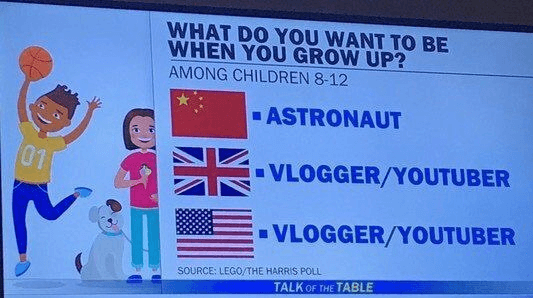
What do you want to be when you grow up? (China, UK vs. US) - Credit: Reddit
Never the less, as we earlier looked into the examples of online concerts and OnlyFans, and combine that with the profession of online content creators and eSports stars, suddenly the world of entertainment is definitely moving away from the stadiums and venues. This is huge itself, and leaves the TV generation into dustbin of history. As the purpose of this article is business in the context of metaverse, let's take a quick ideation what needs we have to solve in the future.
Probably one of the easiest addition to mass audience events is the advertisement space.
Probably explains Facebook's (sorry, Meta.com's) eager investments into metaverse. What does an advertisement agency in the metaverse look like? Will we be part live sport through VR head sets for a more immersive experience, and live ads change depending on our viewpoint.
What I know about advertisement in eSports is this: The audiences in metaverse are already in their tens of millions, and access to this audience is described as "unreachable" by your traditional brands and means.
People involved with eSports provide access to this audience, which they describe as "valuable, digital, high-income, high-spending, passionate millennial". Let's ask which global brand does not require access to this in the near future in their attempts to stay relevant in the changing world?
I quite frankly have no idea, but it will not take long until we will see it in action. I'm interested to see how Google plays its cards in this respect. I'm sure they have some internal multi-billion project ongoing which I'm still totally clueless about like rest of the world.
If we are able to forecast with some certainty that audiences and advertisers who follow them are going to be present its not a big leap to think we need all other business to business services to support them.
I'm so curious to see politicians, with their laws, and then the lawyers, adapt to a world without domicile. Hello, politicians! Seriously, wake up!
How about the accountants? Do we get dispute resolution systems of the given "owner" of the metaverse, and what kind of mess this entails.
How do I do payroll of my staff without any knowledge of their physical location? Thankfully I'm not a lawyer and can stay sane not overthinking this. By turning this around, it is going to be a huge opportunity for the ones who lead it.
There are going to be industries left in solely physical world as well. As a human being, I need food, shelter, warmth and so on. Is there going to be physical job market based on the location, and then a freely roaming group of people in the metaverse. Who is going to create more value and accumulate wealth?
Are we soon enough thinking that food, water, etc. commodities supplies are just "infrastructure" like roads are?
Are we going to have e-commerce companies and delivery drivers as our proxies between the working world and real the world? So many questions how this is going to span out, but the change is under its way and that is not something we can stop.
There is never anything certain about the future, and the end goal, but it seems some of the aspects of the future will play out. I'm sharing at least a couple of trends from a people point-of-view which feels unavoidable to me. These are physical location independent job markets, and the need of innovation, management, leadership and conducting business in the online world.
The location independent job market is in full swing already. Past decades industrial production have often taken place where the labor market has provided a supply of talent for a price that is beneficial. Yup, I'm talking about industrial miracle of China.
That's all in physical world though. How about our couple of decades of mass off-shoring, or near-shoring of mundane office tasks? Looking at outsourcing destinations like India, Ukraine and elsewhere.
In my previous examples the location has actually been dependent on physical location, like a central office, or factory within a geographical area. We are really going into the world of remote employment, where it does not matter where you are. This is as long as companies are able to find way to deal with taxation, employment laws, and related bureaucracy.
My thought is to tap into global talent marketplace and never look back. It is going to be interesting how to compete for a talent in the marketplace in the future.
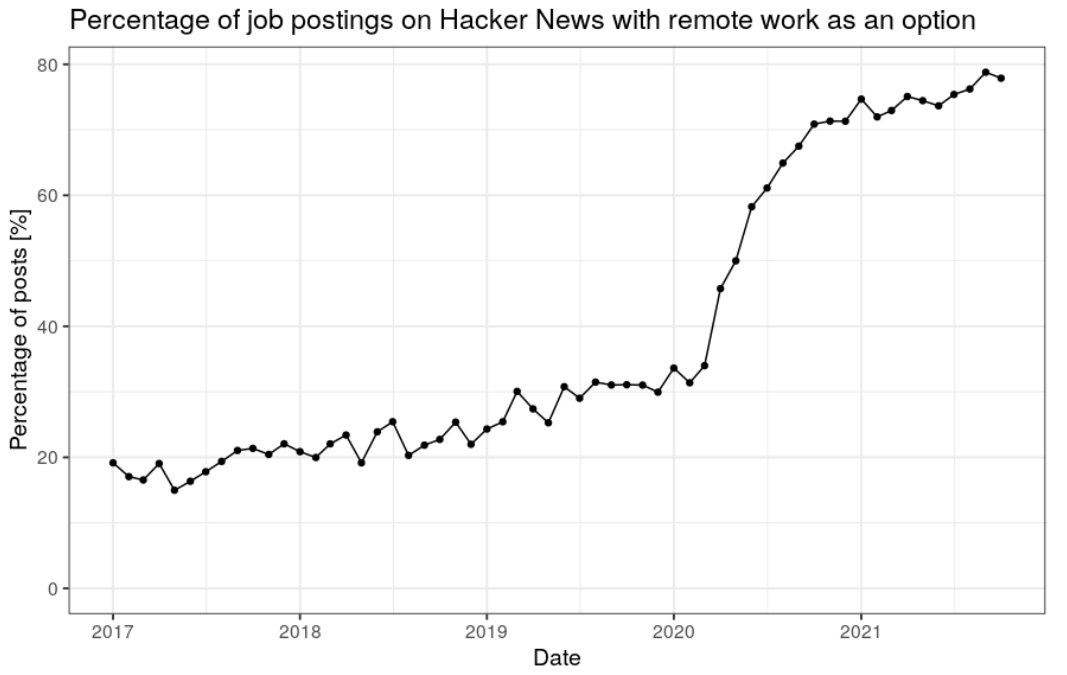
Percentage of job postings with remote work option - Source: Hacker News
Providing safe, enjoyable and productive working environment is still going to be an important part of choosing an employer.
I'm eager to see how office perk based goliaths are going to adapt to the online and remote needs of the employer and employee.
Even the thought leaders of the day don't in my mind get the whole picture of the transformation we are undergoing.
Some of the examples from recent article from HBR nicely underline this. Or do you think the future trend in the workplace is seriously going to be "continual bulk purchases of the Covid vaccine" or whatever comes next?
I also have issues with "Mental health support is the new normal". I don't mean it is a bad thing to provide this support, I think it is extremely important, but more so I think the future of work must find a way how to conduct work without causing mental health issues.
For you to be the winner in the age of the 'great resignation', or 'great attrition', or what ever term you choose, you should look into your team, your people, the ones who really create the value that keeps your company running.
I'd suggest you take a good look and see how you can create an environment where your people will flourish, online or offline without distinction. It's all about the culture you create, how you communicate and how your processes are going to adapt to the new world.
I have created Flowtrace to address the pains of managing inter-team collaboration and team productivity. I feel strongly this topic is something that is going to define how connected your remote people will feel and how good decision making in your organization is going to create in the future.
The whole of your strategy and alignment is going to be dependent on the visibility you have over your remote workplace. You should be asking questions how you are going to ensure work gets passed along your teams effectively, and in a timely manner in a workplace which might not physical anymore.
We address productivity and briefly touch on collaboration, both are pillars of innovation. And innovation is arguably a defining factor of competitive advantage.
At Flowtrace we are already seeing early results from our clients, by increasing visibility on collaboration and productivity they are tapping into a wealth of new connected decision intelligence, which in turn is delivering better business outcomes.
Btw. you should check out our other use-cases as well.
In my view, we are on the brink of a industrial revolution. This is your chance to choose the direction you take. If you are a company within knowledge worker space, and don't want to be extinct, think carefully about forcing your employees back to office.
Companies, even the greatest ones, have always failed when they failed to adapt, and adopt the ways of the future. First, you will lose your employees, the core source of your value, the innovation, and capability to serve clients, if you try to stay in an old world of thinking. Do this only with your own peril and remember, you have been warned.
Let's make the future of work and metaverse, work 'for' us, instead of it working us!
Read to learn from Olga, CEO of Monshare, how to manage time when you are building remote team with a goal aligning everyone across 3 continents.
How to build a startup team. We interviewed Olga, CEO of Monshare, how she used Flowtrace to build remote team and get her business started.
Communication priorities and culture shapes the way how remote teams, and remote company grows as explained by Olga, CEO of Monshare.